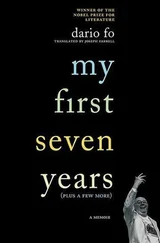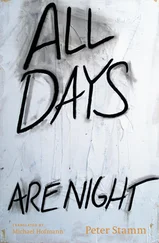She went back to the bungalow with me that evening, and we slept together, but I had the sense she was doing me a favor. The bed over the steps wasn’t especially solid, and it creaked so loud that Sonia finally asked if I was sure it would hold up. Do you think your neighbors are in? Never mind them, I said. I’ve heard them at it often enough. But the thought that someone might be listening to us bothered Sonia so much that she stiffened and grabbed hold of me. Not so hard, she said, or we’ll crash. She kissed me mechanically a couple of times, then she said she’d better go home, she had something in the morning she didn’t want to be late for.
We were now seeing each other regularly. Sonia invited me back to her place, and told Birgit and Tania about us. She did it in such a weirdly formal way, it felt like I was being introduced to her parents. In spite of that, I didn’t really have the feeling Sonia was my girlfriend. I would occasionally spend the night with her, but when we made love, I could feel her anxiousness. The least noise made her flinch. You know this isn’t a crime, I said. You don’t understand, said Sonia.
My internship started in September and Sonia’s in October. After she had sent in her competition entry, we had a couple of days free and drove to Stuttgart, to look at Mies van der Rohe’s Weissenhof Estate. She had been there once before, with the class, but I’d been low on funds and hadn’t been able to go with them. Now Sonia showed me around like a tour guide. She talked about stereometric form and the absence of ornament as a sign of spiritual force. To my mind the buildings were superficial and uninteresting. In their naive functionalism they were somehow of no particular period. Living isn’t just eating, sleeping, and reading the paper, I said. A living room is first and foremost a place of refuge. It has to offer protection from the elements, the sun, hostile people, and wild animals. Sonia laughed and said, well, I might just as well go to the nearest cave in that case.
We spent the night in a pretty basic hotel. On the staircase there was a vending machine for drinks, and we took a couple of bottles of beer up to our room. The floor in the hallway was linoleum, but the room was carpeted, with thick curtains in the windows, reeking of cigarette smoke. We sat down side by side on the bed, drinking our beer. Suddenly Sonia started laughing. I asked her what the matter was. She said this place was so awful, you had to laugh or cry. And she preferred the former. That night we made love. Sonia was much less inhibited than in Munich, perhaps the ugliness of our surroundings had a liberating effect on her. When I stood by the window later, smoking, she came up to me and took the cigarette from my hand, and had a puff. You’re cute when you smoke, I said, clasping her waist. Kiss me. Once in a blue moon, she said, pressing herself against me.
Sonia insisted on paying for the room, her father had given her money when she graduated. But surely not to keep a fancy man on, I said. Do they even know about me? Sonia hesitated, and I noticed that the subject was difficult for her. I had told my parents about Sonia, albeit in a casual way, and they hadn’t asked me any further questions.
Then my internship began, and now it was me who never had any time. The firm was on the edge of the city, and I rarely got back from work before nine or ten. I was so exhausted then that I didn’t feel like going out afterward. Sonia called me every day, but it didn’t seem to bother her that we only saw each other on weekends.
At the end of the month I had to move out of my bungalow in the Olympic Village. Birgit and Tania were fine with me staying in Sonia’s room until further notice. Before I could offer Sonia my help, she had already carted her things back to her parents’ house and tidied the room. I didn’t have a lot of stuff. A tabletop on two sawhorses, a mattress, and a couple of cardboard boxes full of books and records. I bequeathed the rest of my stuff to the person moving in after me. Rüdiger and Sonia helped me move, then we went for a meal together, and then they took the train back to Lake Starnberg. I had asked her to stay with me, but she wanted to spend her last few days in Germany with her parents. On the eve of her departure we met up one more time. Sonia was nervous and eager to get home. We said good-bye without making any promises. Be good, was all Sonia said as she got into her car. You too, I replied, and waved to her till she turned the corner.
We were a good match, so everyone said, but we both knew that plenty could happen in six months. Sonia had said she didn’t want to commit herself in any way. She was right at the beginning of her career. Maybe she’d stay in Marseilles, or she’d accept an offer to go somewhere else. She would love to work in a big bureau in London or New York. We’ll see, I said. Maybe it’ll be good for us to be separated for a while, Sonia said, and if we’re still together come the spring, well then, so much the better.
Sonia wrote me every week, so regularly that it seemed to me to express a duty rather than a need. She wrote to say she was fine, and she asked when I could visit. I replied that I had a lot on my plate, and wouldn’t be able to get away from Munich very easily. Maybe over the holidays. But she’d be in Starnberg with her parents then, she wrote. I got the sense she didn’t really mind conducting a long-distance relationship. She could use it to keep other men away, and give herself wholly to her work. Her boss was a genius, she wrote. She always referred to him by his first name, as though they were old friends, and after a very short time, it was all “we” and “us.” We’re building a day care. We’re entering a competition to build a conference center. We think architecture should appeal to all the senses, it wants to be seen, touched, smelled, and felt. I resisted the temptation to tell her to cut the crap. Presumably I was just jealous. The office where I was an intern specialized in unimaginative office buildings. The company motto was the customer knows best, or maybe money doesn’t stink. In one of her letters, Sonia quoted Hermann Hesse. So that the possible can come into being, the impossible has to be attempted again and again . I pictured her walking along the beach with her Albert, the mistral playing in her hair, and her appealing to all the senses of her boss. She was gazing at him adoringly and he was quoting Hermann Hesse to her. Every beginning has its magic. I felt good in my jealousy, even though I was sure that Sonia was faithful to me, and that she took our relationship seriously, maybe more seriously than I did. When we talked on the phone, occasionally we made plans, we discussed founding a firm one day, after we’d accumulated some experience. But I wasn’t accumulating any experience, my work consisted principally of constructing models and filling in work schedules. For months I sat in a windowless office, sketching identical staircases. Even though I was kept busy, I was bored. Boredom had a seductive charm. Secretly I enjoyed having no responsibility and nothing to aim for. I didn’t go looking for a better job, ordered no competition guidelines, and read no architectural journals. Instead I immersed myself in books by dead authors. I read Poe and Joseph von Eichendorff, Mircea Eliade and Giambattista Vico, and it was as though their writings contained a truth that I could at least sense, though it could never be proved. By way of Aldo Rossi I came across Étienne-Louis Boullée, a pre-Revolutionary French architect who designed melancholy monumental structures not one of which had been built. I became fascinated by his way with light, which in his drawings wasn’t a given, but more like a substance. It looked as though the buildings were pushing back against a stream of light, against the stream of time.
Читать дальше












